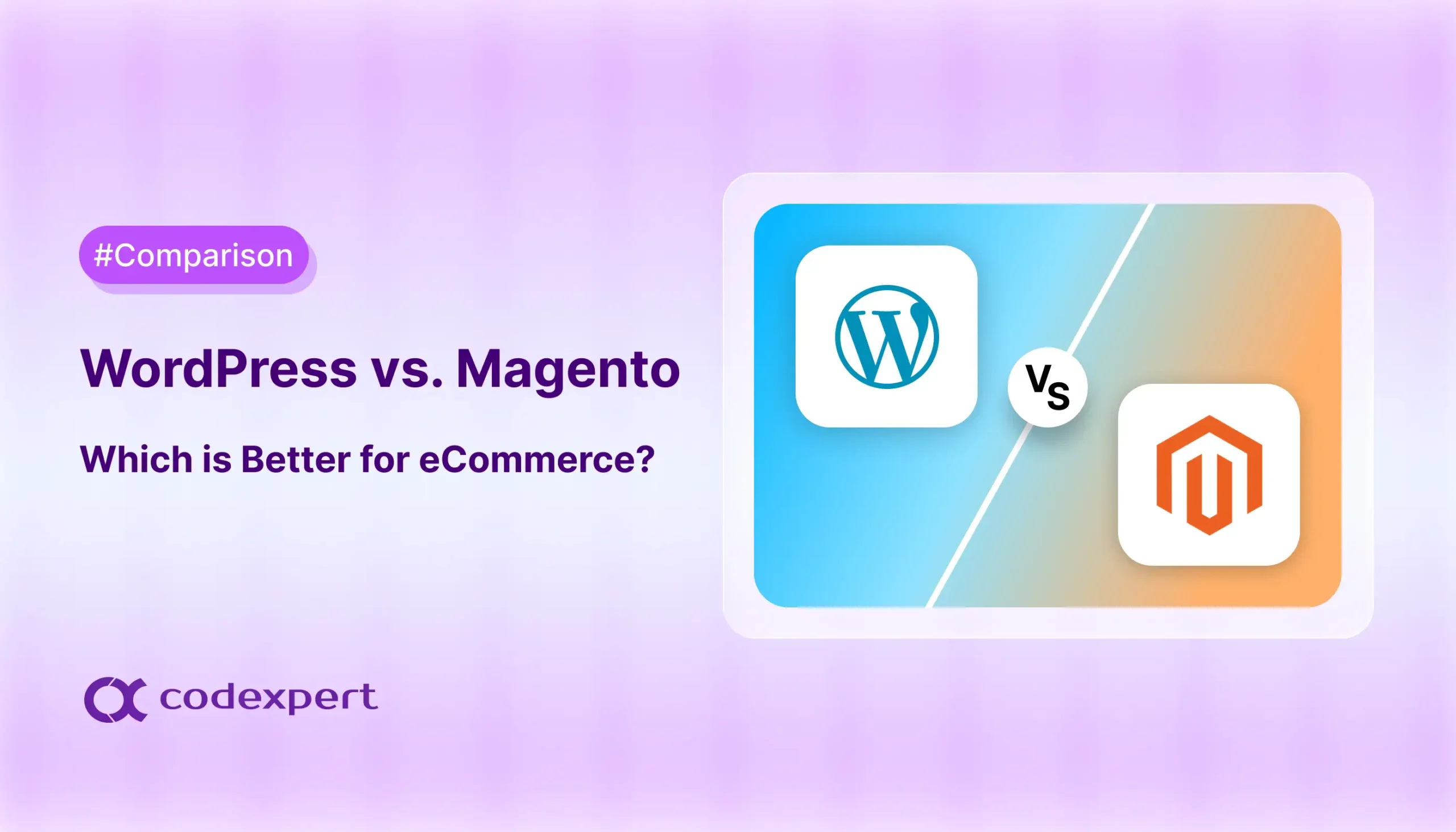Joomla vs WordPress – Which CMS is Better?
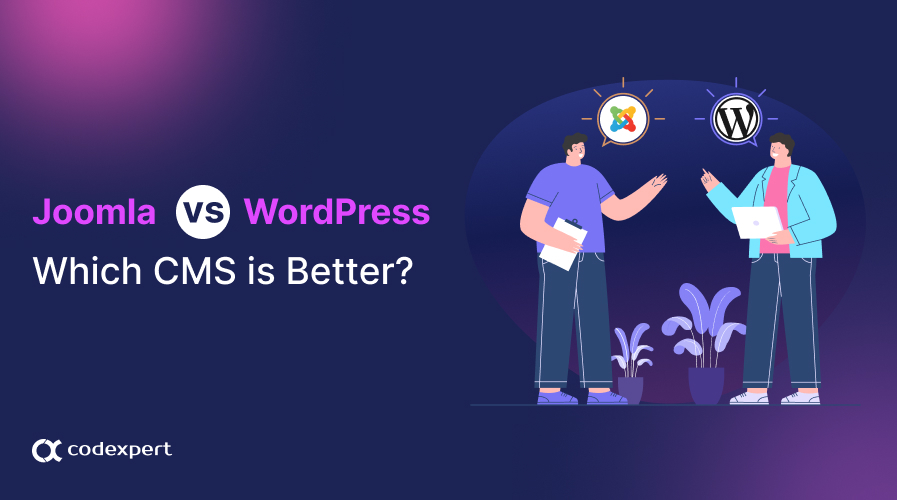
Are you stuck between Joomla and WordPress for your next big online project? These two CMS giants have been battling it out for years. And while both platforms have distinct advantages, only one can reign supreme for your website.
In the past, we’ve compared other contenders like Shopify vs WooCommerce and website builders like WooCommerce vs Squarespace. Now, it’s time to turn our focus to the heavyweights of the CMS world: Joomla vs WordPress.
Let’s dive in and analyze their strengths to determine whether Joomla or WordPress is the best fit for your business!
Joomla vs WordPress – Introductions and General Statistics
Before we dive into the specifics of the debate between WordPress vs Joomla, let’s get acquainted with the platforms. The below sections will explain how these platforms climbed the ranks and became a favorite among website owners.
What is Joomla?

Joomla is a powerful and versatile content management system (CMS) that allows users to create, manage, and publish digital content with unmatched ease. With its user-friendly interface and strong community support, Joomla is the perfect solution for anyone looking to build and maintain a professional, feature-rich website.
Originally launched in 2005 as an open-source project, Joomla became the second most popular CMS after WordPress. Currently, it’s being used by around 2.4% of all CMS; and 1.6% of all websites (W3Techs, 2024).
While Joomla still ranks second in the CMS market share, it has been deteriorating slowly since 2010. Its complete share of the website market has also witnessed a steady decline as of 2021 (W3Techs, 2024).
Here’s a chart to show where Joomla stands in the market share among other CMS platforms –
What is WordPress?

WordPress is a widely popular open-source platform, used to create and manage websites with minimal technical expertise. Its popularity can be attributed to its user-friendly interface, extensive plugin ecosystem, and vast community support.
Launched in 2003 as a blogging platform, WordPress quickly evolved into a full-fledged CMS, gaining immense traction in the world of web development. Today, WordPress dominates the CMS market, holding a whopping 62.7% share, and it’s estimated to host about 38,000,000 live websites (AISEO, 2024).
While Joomla initially held a competitive position, WordPress gradually gained momentum, eventually surpassing Joomla in popularity around 2010 and maintaining its dominance ever since. In terms of popularity for Joomla vs WordPress, the latter quickly took over and still maintains a steady grip of the industry.
Here’s a side-by-side comparison of Google search interest in ‘WordPress’ and ‘Joomla’ from 2004 to the present –
Joomla vs WordPress – Advantages and Disadvantages
Now that we’ve established the basics, let’s look into the main advantages and disadvantages of Joomla or WordPress to help you weigh your options better.
Joomla Advantages
In the debate between Joomla vs WordPress, Joomla has some clear advantages that makes it a great option for website and ecommerce store owners alike, including –
- Flexible Customizations: With thousands of extensions and templates available, Joomla provides a high level of customization which is perfect for creating complex websites with unique features.
- User Access Control: Define different user groups and control what each group can do on your site with Joomla’s advanced access control levels (ACL) and other user management features.
- Built-In Multilingual Support: Joomla comes with native multilingual capabilities, so you can easily create and manage websites in multiple languages without needing third-party plugins.
- Community Support: Joomla has a large and active community of users and developers, giving you access to plenty of resources, tutorials, and support when you need it.
WordPress Advantages
When it comes to WordPress vs Joomla, the flexibility of WordPress often makes it a better alternative to Joomla for website owners.
- Ease of Use: WordPress is renowned for its user-friendly interface, making it easy to create and manage a website without technical expertise.
- Large Ecosystem of Plugins and Themes: WordPress has a massive ecosystem of plugins and themes, allowing you to add new features and customize your website without writing custom code.
- SEO-Friendly: WordPress is inherently designed to be SEO-friendly, featuring clean and optimized code to allow search engines to index your site easily. There are also a wealth of SEO plugins available to further optimize your content.
- Strong Communal Support: Similar to Joomla, WordPress has a large and active community of users and developers, to help provide ample resources and support for both beginners and experienced users.
Joomla Disadvantages
- Steep Learning Curve: Joomla’s interface, though powerful, can be more complex to navigate than WordPress, especially for beginners.
- Slower Performance: Joomla websites can sometimes experience slower loading times compared to WordPress, particularly for large or complex sites.
- Limited Template Options: The overall selection of Joomla templates may be smaller than WordPress’s, which can limit customization options for some users.
WordPress Disadvantages
Whether you’re picking between Joomla or WordPress, there are some clear downsides of using WordPress.
- Security Concerns: Due to its self-hosted nature, WordPress is a frequent target for hackers. While there are many security measures in place, it requires diligent maintenance and updates by the site owner to mitigate risks.
- Performance Issues: With numerous plugins and themes available, WordPress websites can become bloated over time, resulting in slower loading speeds.
- Dependency on Plugins: WordPress heavily relies on plugins to extend its functionality, which can introduce potential compatibility issues and security risks if not managed properly.
Joomla vs WordPress – Features Overview
To provide a more comprehensive overview of the comparison, let’s take a look at the main features offered by Joomla and WordPress. Here are the features we will be comparing in the following sections –
- Ease of Use
- Customizations
- Content Management
- SEO
- Support
- Payment Gateways
Ease of Use
Usability is a major deciding factor for any website builder, whether its Joomla or WordPress. The below section includes the installation process, navigating the administrator area, and the overall learning curve of both platforms.
Joomla
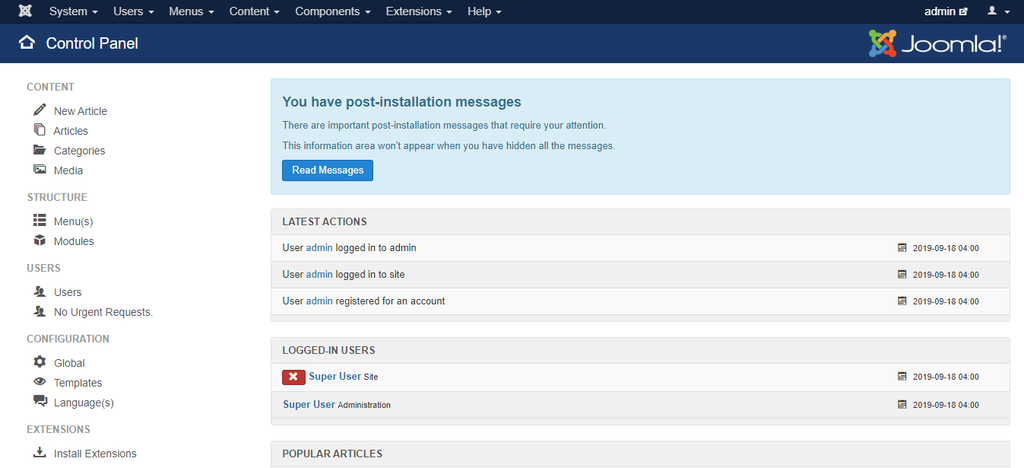
Joomla was primarily designed with developers in mind, meaning new users, especially those without a computer science or web development background, may face a steeper learning curve. Its powerful set of features, while beneficial for advanced users, can be challenging for the average website owner to understand and use fully.
Also, its backend interface is full of web development terminology, which can be difficult to navigate for beginners. However, Joomla offers page builder extensions, forums, and tutorials to make the process easier for newcomers.
WordPress
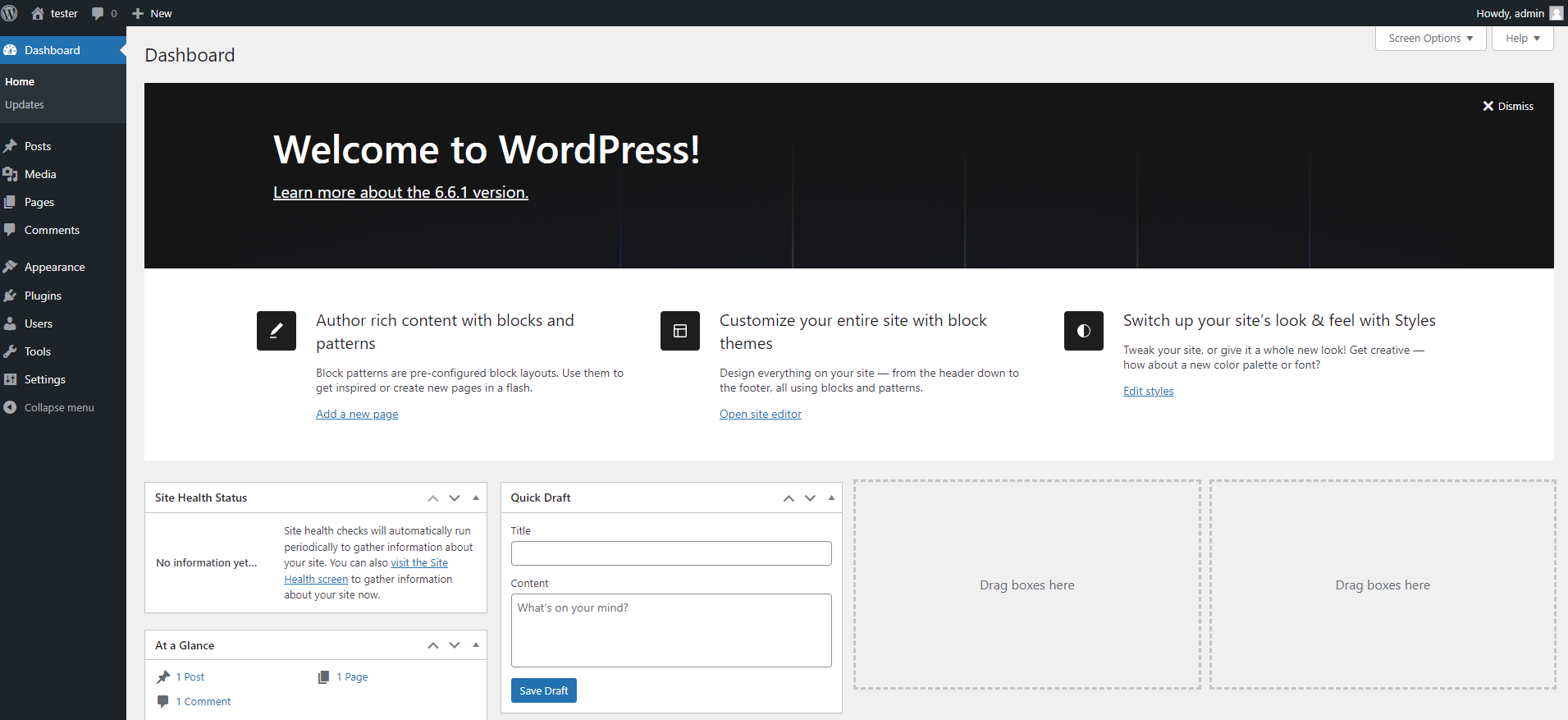
Compared to Joomla, WordPress shines in terms of user-friendliness. Its admin dashboard has a clear layout with a well-organized sidebar displaying core functionalities like Pages, Posts, and Media.
While some settings and tools might take some time to get used to, the overall navigation is significantly intuitive. With a massive library of plugins, selecting the right ones can also be difficult for some. However, WordPress’s basic workflow revolves around clear-cut post and page management, so it’s easy to learn the ropes, even as a beginner.
Winner
In terms of hosting, both platforms are equally accessible but WordPress is significantly easier to understand and navigate for both technical and non-technical users.
Customizations
When gauging the quality of a CMS platform, no aspect is more important than customization. This section will compare the customization flexibility for WordPress vs Joomla to assess the extent to which you can personalize your website –
Joomla
Joomla is highly customizable but its options are primarily geared toward developers or those with advanced technical knowledge. For content creators or site owners without extensive experience, customizing your Joomla website can be complex and difficult to navigate.
Even with a large library of templates, themes, and extensions, the process of installing and configuring them can be confusing compared to WordPress. The process often requires you to select “position” numbers for each element, meaning it can take longer to figure out how to display things the way you want.
Testing and implementing these features is an even bigger challenge, especially if you’re doing this for the first time.
WordPress
With WordPress’s massive plugin and theme ecosystem, even novice users can make your website look professional without much trouble. Whether you’re looking to add eCommerce functions or customize advanced features, WordPress’s plugin directory has a solution.
WordPress also has built-in tools like Theme Customizer, which lets non-technical users personalize existing themes and developers edit CSS or PHP for granular control. WordPress is known to encourage experimentation, so you can switch themes, and add widgets, and modules with plugins like CoDesigner, without worrying about irreversible changes.
Winner!
Unfortunately for Joomla, no platform can compare to WordPress when it comes to customization. WordPress itself is built around this aspect, and it takes little to no technical knowledge to get started.
Content Management
Managing content is one of the biggest functions for CMS, especially for WordPress vs Joomla, as these are both initially built to be a blogging tool. This section will examine how WordPress Joomla enable content management, user access control, and the platforms’ functionality for blogging.
Joomla
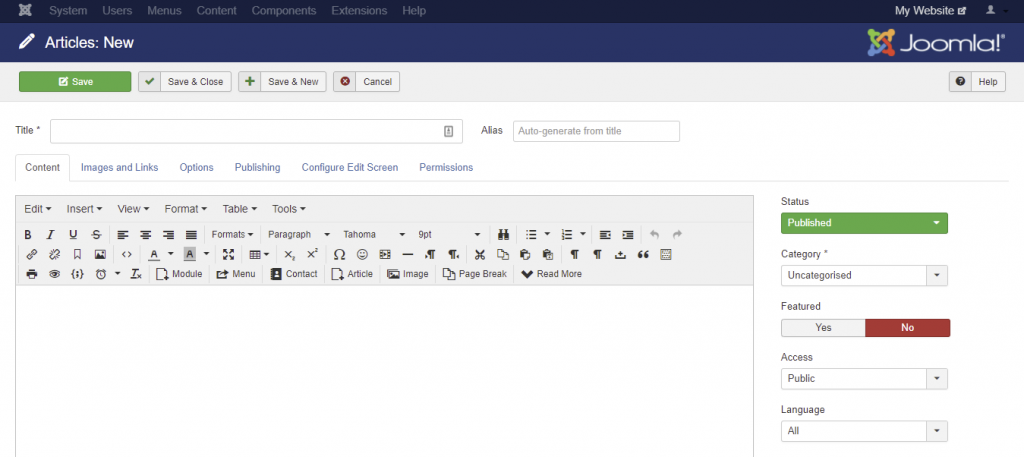
Joomla has three-page types—single format, category blog, and custom module—to structure your website’s content. Before publishing a post, you’ll need to create a category. The platform includes a WYSIWYG (what you see is what you get) editor called TinyMCE for easy content creation, and you can install additional editing extensions for more customization.
While Joomla lacks a built-in taxonomy system, you can add this functionality through extensions or custom development.
WordPress
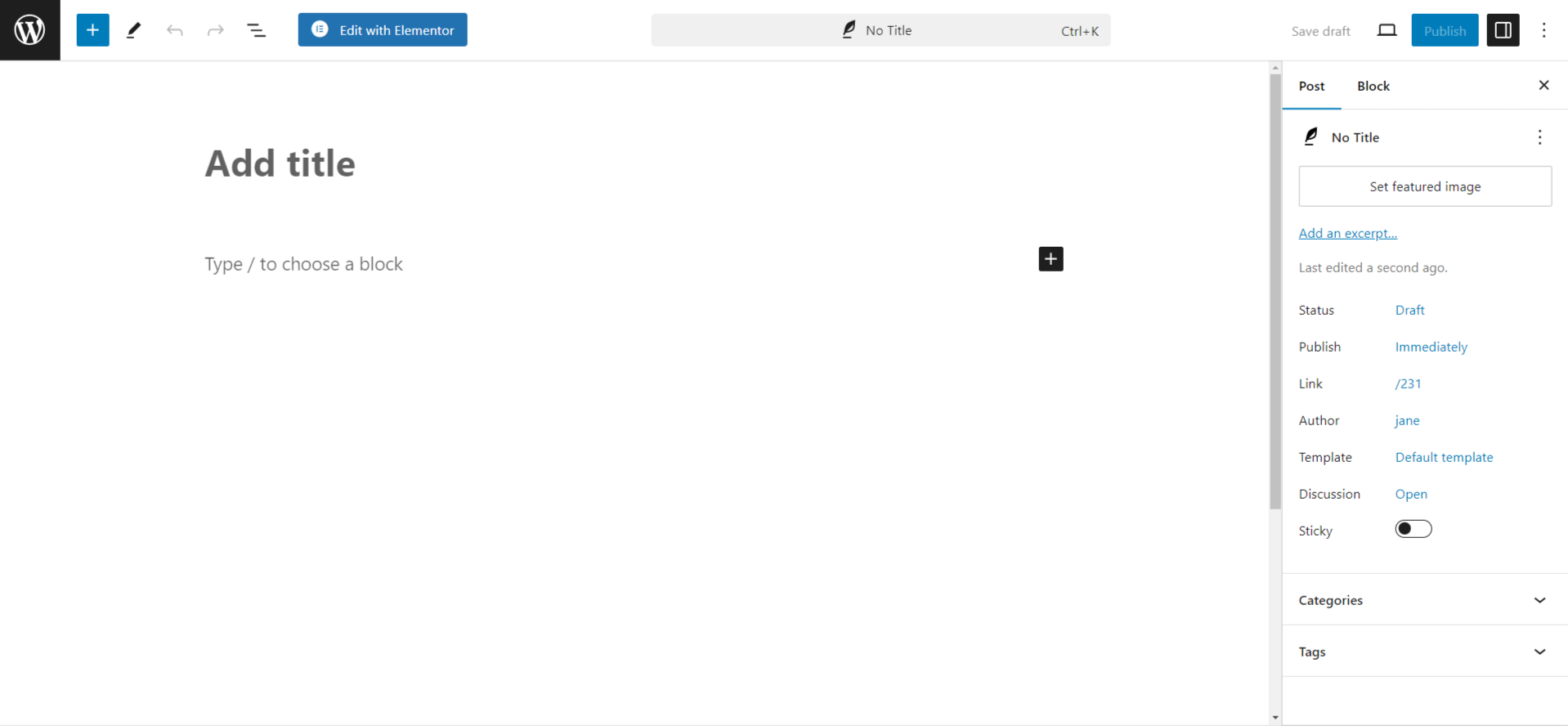
WordPress was originally built for blogging, so it’s excellent at handling lots of content and different types of media files. Even before the Gutenberg editor was created, making posts and pages was simple. Gutenberg itself also supports HTML for advanced customization, even without coding.
You can choose between static and dynamic page types, and WordPress has a system to organize your content using categories and tags. It also has six built-in user roles to manage access to your website. You can add more user roles or customize user management with plugins like Share Logins.
Winner!
In the debate between Joomla vs WordPress, WordPress is the better choice for blogging. You can create custom taxonomies to manage and display a large amount of content much more efficiently, compared to Joomla.
SEO
If you intend to sell on this platform, optimizing your store for search engines should probably be your first criteria. This section will discuss the built-in features and additional extensions available in both WordPress and Joomla that can help your site rank higher in search engine results –
Joomla
Joomla has basic built-in SEO tools to customize page titles, add .html extensions to URLs, and create search engine-friendly URLs. For more advanced SEO options, you can use extensions like JSitemap or QuixRank, and get features like metadata control and page-level optimization. Unfortunately, Yoast SEO Joomla is not available.
Keep in mind that Joomla’s out-of-the-box SEO settings can be difficult to navigate for beginners. Even using plugins can be complex, especially if you’re new to web development.
WordPress
WordPress has built-in SEO features like meta tags, permalinks, and image alt text. There are several themes and plugins like Yoast SEO to improve your website’s search engine ranking by giving you tips on things like internal linking, readability, and keyword usage.
You can also track your website’s traffic, links, and marketing campaigns with analytics plugins like MonsterInsights and JetPack.
Winner!
While both platforms feature built-in SEO tools for basic analytics, WordPress has better options in its directory to overcome missing features that can be found in Joomla.
Support
Neither Joomla or WordPress offer free support, however the quality and price of the support determines the winner for this. This section will discuss the level of support provided by both platforms to their users and evaluate how easily accessible their support channels are.
Joomla
Joomla has a supportive community forum and a wealth of online tutorials and guides. However, finding professional assistance for technical issues can be more challenging and costly compared to WordPress.
Also, the smaller community size of Joomla might mean fewer experienced developers or agencies specializing in its platform. Third-party support plugins like Helpdesk Pro can be downloaded for $29.99, which can be a significant investment.
WordPress
Due to its open-source nature, WordPress doesn’t offer live support. But its vibrant community forums provide a wealth of assistance from beginners to experts.
If you need more personalized help, you can easily find freelance developers on platforms like Upwork and Toptal. Given WordPress’s popularity, hiring a developer to support your website will cost you around an hourly rate of $15 to $30.
Winner!
In the Joomla vs WordPress debate, there is no clear winner when it comes to support. Neither platform offers dedicated live support, but you can use paid extensions or third-party platforms to get technical expertise when needed.
Payment Gateways
If you’re considering selling any type of goods on your website, knowing which payment gateways will be supported can help you significantly optimize the purchasing process. Here’s the options for payment gateways for WordPress vs Joomla –
Joomla
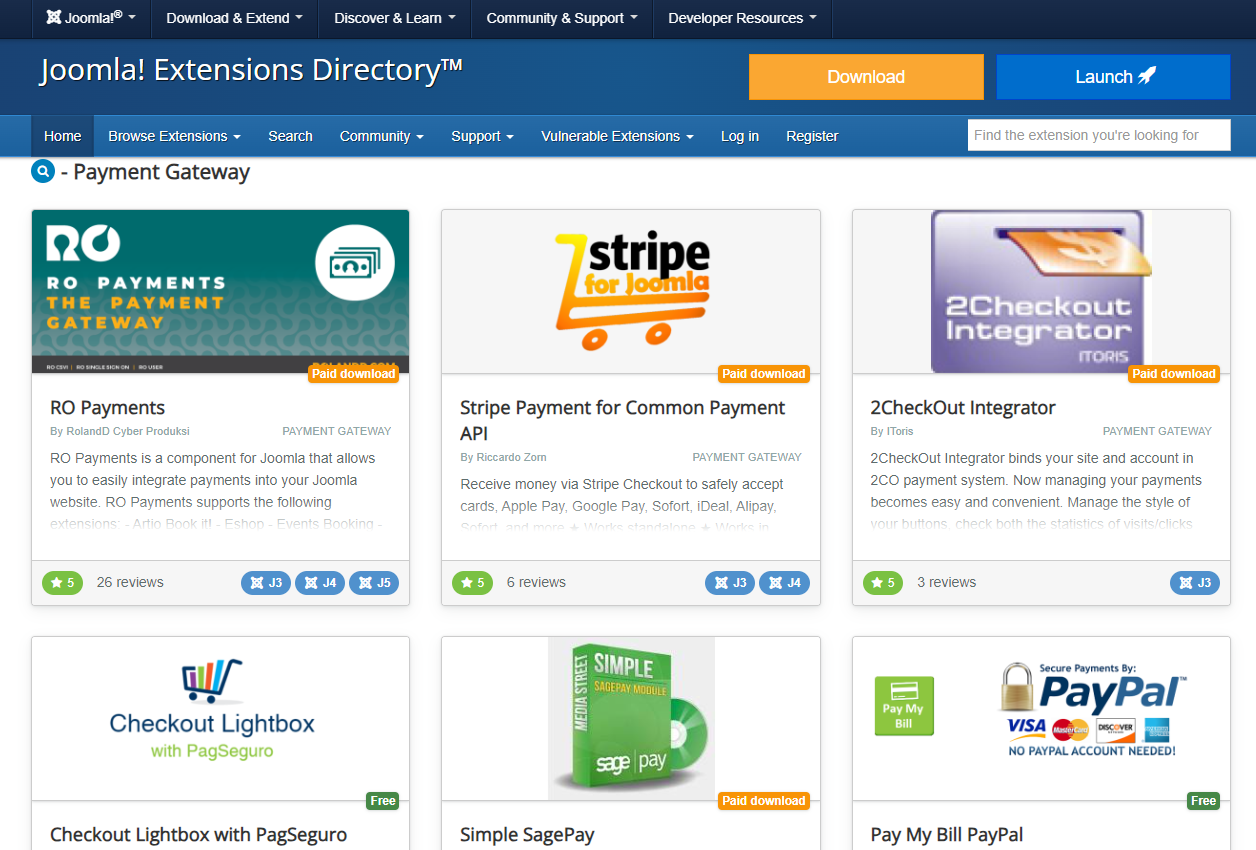
With Joomla, you can access eCommerce capabilities through extensions like HikaShop, which enables you to create product catalogs, and shopping carts, and manage transactions. HikaShop supports over 60 payment gateways that let you accept payments from customers worldwide.
You can also use free and premium extensions to access specific gateways and their support.
WordPress
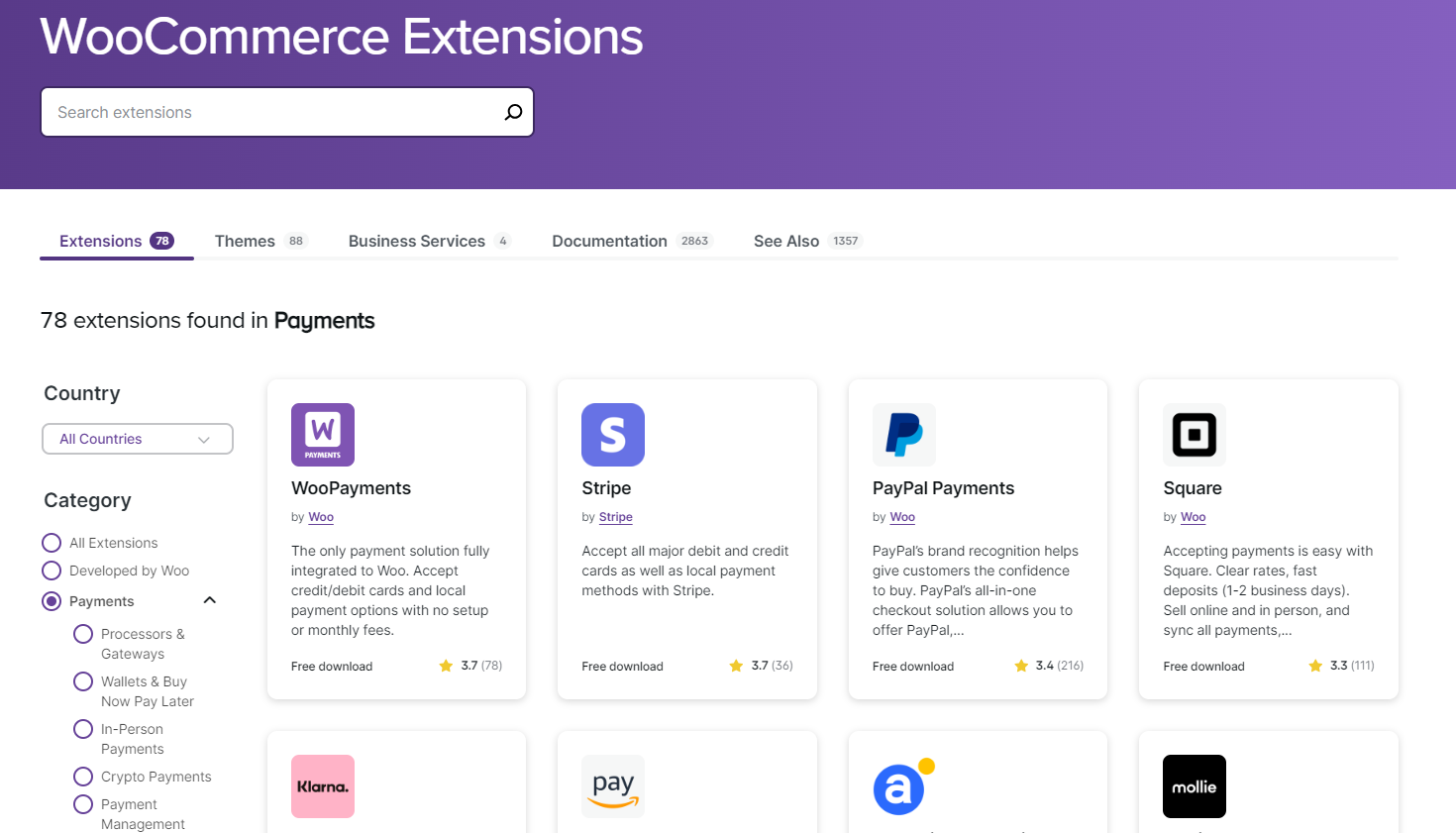
WordPress supports over 100 payment gateways that accept local and international payments, using plugins. The popular options include PayPal, Stripe, WooPayments, Authorize.Net, and Square.
You can accept credit cards, digital wallets, and other payment methods using these gateways. If you’re looking to offer paying in installments, use plugins like Klarna or Splitit.
Winner!
In regard to payment gateways, WordPress stands as the clear winner. While Joomla offers extensions to access multiple gateways at a time, WordPress has more official plugins for payment in their directory.
Before we reach the final verdict, Drupal is another top contender for WordPress that’s worth considering. Get a clear overview of Drupal vs WordPress before picking the best option.
Joomla vs WordPress – Final Verdict
If you consider the winners for each of the features, you will notice that WordPress stands out for almost all of them. However, if you’re still on the fence about Joomla vs WordPress, you need to take a closer look at what your website needs and which aspects you want to manage.
If you’re new to website building, WordPress might be a better fit due to its simplicity and extensive plugin and theme ecosystem. However, Joomla offers more built-in features and flexibility for users with technical skills.
Make sure to consider each aspect and weigh your options carefully in the debate of WordPress vs Joomla before choosing your ideal platform. Good luck!
Frequently Asked Questions (FAQs)
Q. What type of website is Joomla best for?
Joomla is well-suited for websites that require a high level of customization and flexibility. It’s ideal for complex projects such as corporate websites, online communities, and e-commerce stores.
Q. Is WordPress good for beginners?
Yes, WordPress is generally considered a beginner-friendly CMS. Its intuitive interface and extensive community support make it easy to learn and use.
Q. Is Joomla a good website builder?
Yes, Joomla is a powerful website builder. However, it may require more technical knowledge than WordPress, especially for beginners.
Q. Is Joomla or WordPress better for SEO?
Both Joomla and WordPress have excellent SEO capabilities. The best choice for SEO often depends on factors such as your website’s specific needs, plugin and theme selection, and your level of technical expertise.
Q. WordPress vs Joomla vs Drupal – which is better?
- WordPress is the easiest for beginners, with intuitive design and thousands of plugins/themes. Great for blogs, business sites, and online stores.
- Joomla offers more built-in features than WordPress, but has a steeper learning curve. Ideal for membership or community sites.
- Drupal is the most powerful (and complex), best for large, custom websites needing advanced security and scalability.
Subscribe to Our Newsletter
Get the latest WordPress tutorials, trends, and resources right in your inbox. No Spamming, Unsubscribe Anytime.

Thank you for subscribing to our newsletter!
Table of Content
- Joomla vs WordPress - Introductions and General Statistics
- What is Joomla?
- What is WordPress?
- Joomla vs WordPress - Advantages and Disadvantages
- Joomla Advantages
- WordPress Advantages
- Joomla Disadvantages
- WordPress Disadvantages
- Joomla vs WordPress - Features Overview
- Ease of Use
- Joomla
- WordPress
- Winner
- Customizations
- Joomla
- WordPress
- Winner!
- Content Management
- Joomla
- WordPress
- Winner!
- SEO
- Joomla
- WordPress
- Winner!
- Support
- Joomla
- WordPress
- Winner!
- Payment Gateways
- Joomla
- WordPress
- Winner!
- Joomla vs WordPress - Final Verdict
- Frequently Asked Questions (FAQs)
- Q. What type of website is Joomla best for?
- Q. Is WordPress good for beginners?
- Q. Is Joomla a good website builder?
- Q. Is Joomla or WordPress better for SEO?
- Q. WordPress vs Joomla vs Drupal - which is better?











